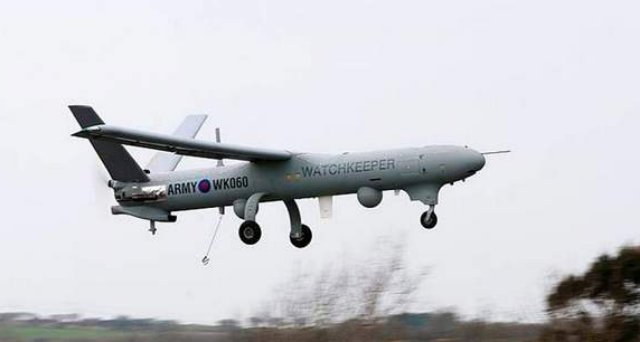Great Britain plans to send the Watchkeeper to Afghanistan this year, possibly to serve with a French Army unit working with the British Army team flying the tactical UAS, a British officer said on April 3 at a high-level defence conference in Paris by the Franco-British Council.
Britain is pulling troops out of Afghanistan this year and still has 5,000 soldiers in the field. France brought back combat troops in 2012.
Meanwhile, the French Army is “full of hope” Paris will order the unmanned aircraft system, a French officer said at the conference.
Thales UK builds the Watchkeeper, based on Elbit Systems’ Hermes 450. The UAS moved closer to deployment in the field after an initial release to service was granted on March 5.
The French Army is testing the Watchkeeper for a potential order of the surveillance system. The 61st artillery regiment attached a team of noncommissioned officers to a British Royal Artillery unit flying the UAS in Wales.
The military on both sides of the Channel might be marching to the same beat, but it is unclear whether the governments will deliver satisfaction to the army high command and industry.
A French decision on acquiring the Watchkeeper has been tied to hopes Britain will order a French infantry fighting vehicle, the Véhicule Blindé de Combat d’Infanterie (VBCI) built by state-owned Nexter and Renault Trucks Defense, French media have reported.
A French Army spokesman was not available for comment.
A linking of the two deals would be “very important” for defence firms, an industry executive said.
A big hurdle for the UK to order the armored vehicle is pressure on the defence budget, a British parliamentarian said.
In London, a Defence Ministry spokeswomen declined to be drawn on whether a final decision had been made to deploy Watchkeeper to Afghanistan.
“The deployment of Watchkeeper to Afghanistan or any location is an operational decision taken at the time to meet the operational requirement,” the spokeswoman said.
The British have used a Thales UK-led intelligence, surveillance, target acquisition and reconnaissance system, based on a by-the-hour payment in Afghanistan, using an Elbit Hermes 450 unmanned aircraft. The service has been used to fill the gap created by delays to the Watchkeeper program.
The 32nd Royal Artillery Regiment, the unit training to operate Watchkeeper, was not among the units recently named by the British for the final deployment to Afghanistan before combat troops depart. That does not mean the unit will not be deployed at some stage during the next few months, military sources said.?
Britain is starting to revive a move toward procurement of a fighting vehicle, after dropping in 2008 a plan to buy the Piranha V vehicle from General Dynamics UK.
In Paris’s attempt to sell the VBCI to London, a VBCI was sent over for the Jan. 31 bilateral summit at Brize Norton Royal Air Force base, when President François Hollande met Prime Minister David Cameron.
“A new phase was opened by that last summit,” said chief executive Antoine Bouvier of European missile maker MBDA.
The announcements of industrial cooperation at that summit was considered a revival of the 2010 Lancaster House bilateral defense treaty, which had stalled as a French election returned a new administration two years later.
The January summit announced plans to sign an order for an anti-ship missile, the anti-navire léger/future air-to-surface guided weapon (ANL/FASGW), along with studies for a future unmanned combat aerial vehicle and an underwater anti-mine drone.
The missile deal shows the need for cutting duplication in the European defense industry and accept a mutual dependence on key technology, Bouvier said.
A resistance to that dependence will mean future weapons “won’t be affordable,” Bouvier said.
For MBDA, one of the lessons learned was the need to take a “long term vision,” one that took into account the different political timetables on both sides of the Channel, he said.
“Without this vision it would have been absolutely impossible to work,” he said. “Timing is an issue, more than funding.”
The Lancaster House treaty “is above politics,” a senior French politician said. The 50-year accord set a long term vision for planning despite political differences between a conservative-led government in London and a socialist administration in Paris.
Hollande sees defence is “important,” a French parliamentarian said.
The President reportedly offered Jean-Yves Le Drian the Prime Minister’s job in last week’s government reshuffle, but the defence minister turned down the offer to stay on in the present post.
The annual defence conference held by the Franco-British Council is a high level meeting attended by British and French defence ministers, army chiefs of staff, senior executives and officials.
Source: Defense News

